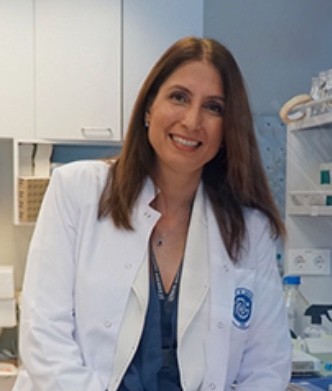
Prof. Hülya AYAR KAYALI
Dokuz Eylül University
Since 2014, Prof. Hülya Ayar Kayalı has been a professor at the Department of Chemistry, Faculty of Science, Dokuz Eylül University. Her research focuses on biopharmaceutical technologies, molecular biology, biochemistry, and cancer therapeutics, with particular emphasis on targeted drug delivery systems, protein engineering, and biosensor applications.
As the head of the Biopharmaceutical Technologies and Bioanalysis Laboratory, Prof. Ayar Kayalı leads pioneering research in intelligent chemotherapeutic agents and drug delivery systems, development of diagnostic kits, and molecular characterization of targeted therapeutics. Her team employs cutting-edge methodologies, including recombinant protein production, bioinformatics, proteomics, and advanced molecular imaging techniques, to investigate key cellular pathways involved in cancer progression and resistance. One of her major research areas is the development of antibody-drug conjugates (ADCs) and exosome-based drug delivery systems for overcoming multi-drug resistance (MDR) in cancer therapy.
https://www.ibg.edu.tr/research-programs/groups/ayar-kayali-lab/
Next-generation Biotechnological Drugs for Targeted Therapies
Prof. Dr. Hülya AYAR KAYALIa,b,c
aIzmir International Biomedicine and Genome Institute, Dokuz Eylül University, Balcova, Izmir, Türkiye
bBiomedicine and Genome Center, Balcova, Izmir, Türkiye
cDepartment of Chemistry, Division of Biochemistry, Faculty of Science, Dokuz Eylül University, Buca, Izmir, Türkiye
hulya.kayali@ibg.edu.tr
Advances in biotechnology have transformed modern therapeutics, enabling the development of next-generation biopharmaceuticals with enhanced specificity and reduced systemic toxicity. Among these, monoclonal antibodies (mAbs), antibody–drug conjugates (ADCs), recombinant enzymes, and nanoparticle-based delivery systems have emerged as key tools for precision medicine.
Monoclonal antibodies remain central to targeted cancer therapy due to their ability to recognize tumor-associated antigens and trigger immune-mediated cytotoxicity. However, limited tumor penetration and prolonged circulation have driven the development of engineered derivatives such as antibody fragments and ADCs, which retain antigen selectivity while improving pharmacokinetic performance.1 ADCs exemplify this new generation of biotherapeutics by linking mAbs to potent cytotoxic drugs through cleavable linkers, ensuring selective intracellular release and minimizing off-target effects.2,3 Advances in linker chemistry, payload optimization, and conjugation strategies have significantly improved their safety and therapeutic index. In parallel, antibody fragments such as Fab and scFv constructs are being utilized in multifunctional platforms for improved tissue penetration and adaptability.4
Recent progress also highlights the integration of nanocarriers, including exosomes and liposomes, as complementary delivery vehicles. Exosomes, with their natural biocompatibility, and synthetic liposomes, with tunable lipid composition, enhance targeted drug accumulation and enable co-delivery of therapeutic molecules.5,6 Furthermore, in silico modeling and in vitro validation approaches are increasingly employed to optimize molecular design, stability, and immunogenicity.7
Overall, the convergence of antibody engineering, nanocarrier design, and computational modeling defines a new era of personalized, multi-targeted cancer therapy. These next-generation systems represent a critical step toward safer, more efficient, and patient-specific precision medicines.
References :
1)Raja et. al. Next-generation therapeutic antibodies for cancer treatment: advancements, applications, and challenges. Molecular Biotechnology. 2025
2) Jin et. al. Emerging new therapeutic antibody derivatives for cancer treatment. Signal transduction and targeted therapy. 2022
3)Tiwatane et al. Chemotherapeutic Drug—Antibody Conjugates (ChemoBodies): Recent Advances and Future Directions. Current Oncology Reports. 2025.
4)Chen, W. Antibody and antibody fragments for cancer immunotherapy. J Control Release. 2020.
5)Yilmaz, G. et al. Exosomes Released from Cisplatin-Resistant Ovarian Cancer Cells Modulate the Tumor Microenvironment. Biomedicine & Pharmacotherapy. 2023.
6)Liu, Y. Targeted liposomal drug delivery: a nanoscience and biophysical perspective. J of Nanoscale Horizons. 2021.
7)Chen et. al. Accelerating therapeutic protein design with computational approaches toward the clinical stage. Computational and Structural Biotechnology Journal. 2023.


